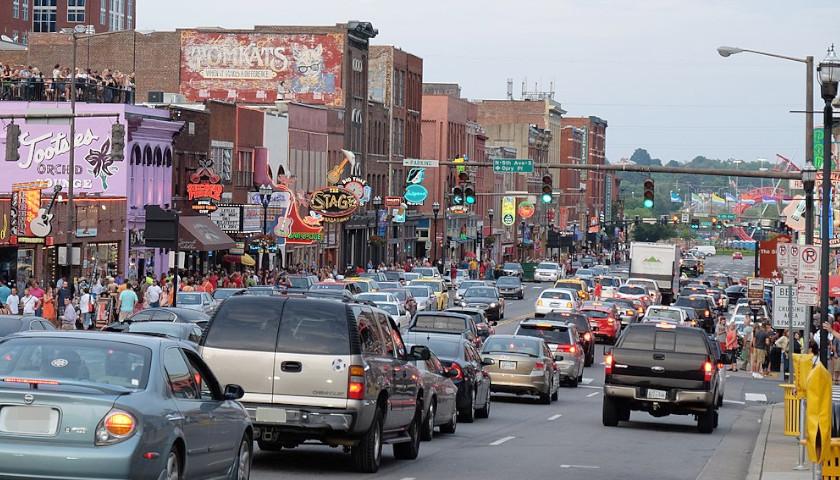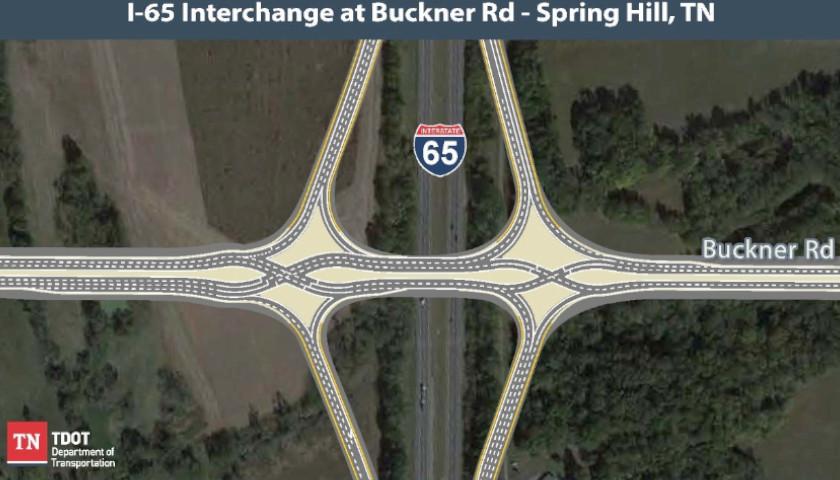The City of Nashville, in conjunction with a group of business owners, is seeking feedback on a plan to reduce traffic in the metro area.
Connect Downtown is a joint project by the Nashville Department of Transportation (NDOT), WeGo Public Transit, the Nashville Downtown Partnership, and the Tennessee Department of Transportation (TDOT), whose goal is “to improve mobility and address traffic congestion in the downtown core.”
The Nashville Downtown Partnership is a collective of more than 100 dues-paying businesses working with the government to reduce traffic in the metro area.
“Our work on Connect Downtown is wrapping up, and we are beginning our final phase of community outreach. We’ve developed a Draft Action Plan, and we need your feedback before we finalize our recommendations,” the city’s website says. “The draft recommendations include priority loading areas, transit priority corridors, mobility lanes, and traffic operations and congestion management strategies, along with many more investments that will make it easier, faster, and safer to move around Downtown Nashville.”
Last year, Connect Downtown collected feedback from 2,128 respondents to a survey, which it then used for its Draft Action Plan.
Respondents largely participated by marking on a map of the city the most difficult roads and intersections to navigate.
Part of the Draft Action Plan includes building a Traffic Management Center (TMC).
“Nashville is building its first TMC, which will manage traffic flows across the city’s street network and support our first responders,” the plan says. “Providing the ability to address congestion in real time, the TMC will be especially helpful during special events, emergencies, and peak travel periods.”
It also includes new adaptive traffic signals to “give traffic engineers the ability to provide additional green time at an intersection, to increase the walk time for a crowd leaving an event, or to give a bus a head start in a busy corridor,” along with more digital signage and “Don’t Block the Box” road treatment.
The 70-page plan also lists specific plans for certain streets.
For example, if the plan is implemented, 4th Avenue and many others would be completely transformed.
“To complement 3rd Ave, NDOT will convert 4th Ave to oneway southbound between Broadway and Peabody St, making all of 4th Ave one-way through the Downtown core,” the draft plan says. “This will provide space for dedicated transit lanes and queue jumps, as well as extra space for priority loading zones. This conversion will help move people in buses and personal vehicles out of Downtown, especially after events.”
7th Avenue would also get a major makeover.
“Although traffic volumes on 7th Ave are relatively low, queueing and loading activity is quite high during the afternoon dismissal at Hume Fogg,” the plan says. “To provide more space for curb uses and to support a two-way protected mobility lane, 7th Ave will be converted to one-way southbound between Dr. Martin Luther King, Jr. Blvd and Demonbreun St.”
Nashville was recently ranked by Forbes as having the toughest commute in America.
– – –
Pete D’Abrosca is a reporter at The Tennessee Star and The Star News Network. Follow Pete on X / Twitter.
Photo “Nashville Traffic” by Cheryl A. Austin. CC BY-SA 4.0.






On another note. I used to take the city bus because I didn’t feel like fussing with traffic. Pretty much had a direct route to work. Someone mentioned how the homeless use the bus to get around. Very true! They would be scouting out there areas in the morning. Talked to a lot of the bus drivers and they all had ideas on what could make WeGo better, but they all said nobody will listen to them. A part of me thinks they don’t want to make traffic better or the decision makers are too head strong to listen to those in the field.
Little late to the party on this one. Timing street lights would be helpful. It’s a 50/60 year old trick. Second, many cities have ordinances stating deliveries are not allowed to peek rush hours (such as at 8am to 9am). The zoning and planning board has been asleep at the wheel as well. They surely don’t have traffic, water drainage, and aesthetics in mind.
I’m so old that I can remember that getting an ID is too much of a burden to vote but everyone needs a credit card to ride on the city bus because they won’t take cash anymore.
When the inmates run the asylum what else can one expect. Leave the figgin’ traffic alone and get those empty WeGo Nowhere buses out of the way.
End MTA / WeGo buses.
I got caught in rush hour traffic yesterday that extended from White Bridge Road to 23rd and Charlotte because a city bus with less than 10 people on it was effectively a rolling road blocking removing one of two lanes out of the city.
Not to mention, it’s latent purpose is to distribute homeless people to encampments on the edge of the county.
Businesses could relocate to surrounding counties, or even rural areas across the State. Then you & your employees would not have to drive to downtown Nashville. What is so great about Nashville downtown anyway, or the suburbs. The tax advantages alone would be a good business decision. Unless of course our governments is using my tax dollars to subsidize the companies they want to succeed.
Not only would there be little traffic issues, but the total environment would be better. Maybe Vit would spur more building of single family homes rather than over crowded, overpriced, dirty living areas for families to raise their children in.
There is an effort by the globalists to reduce population. If they do no one will need your business.
GET SMART PLEASE
From a municipality that has allowed thousands of “entertainment” vehicles, scooters and whatnot to fester in the streets, and who regularly close down main thoroughfares for events.
Gee, what could the problem be?